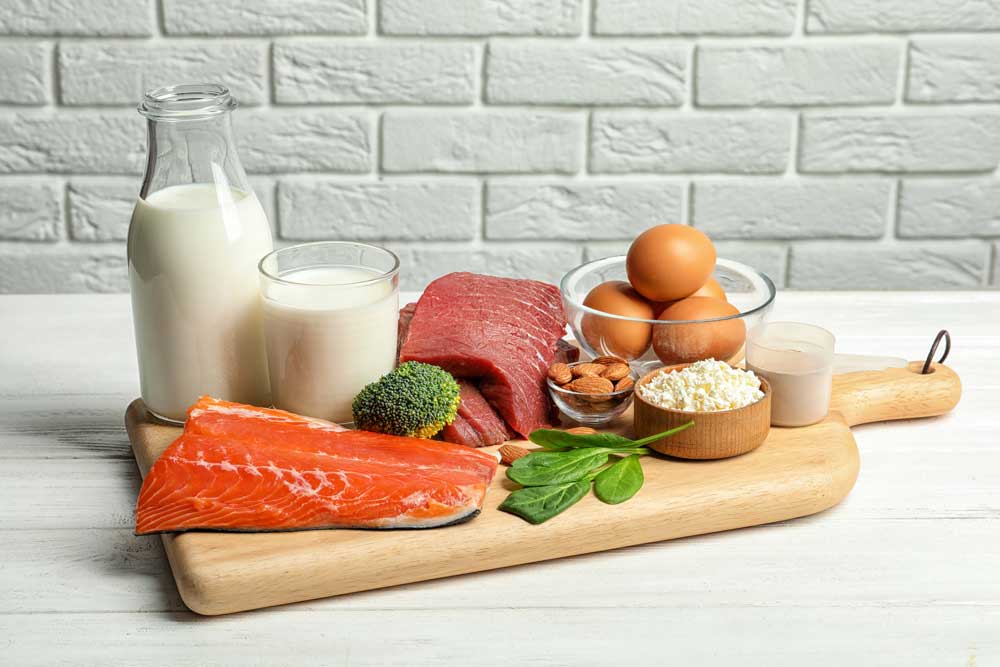The amount of energy the body uses for movement and other processes such as breathing, digestion, blood circulation, cell growth, healing of wounds, and even thinking, is measured in calories. The metabolic rate is the speed at which the body burns energy, or calories. Your metabolism is responsible for fuel produced from the nutrients in the food you eat. This gives your body the energy it needs to move, digest food, breathe, pump blood throughout your body, and heal broken tissues and cells. But your basal metabolic rate—the number of calories you burn while at rest—is also referred to as ‘metabolism.’ Your resting metabolic rate determines how many calories you burn. Numerous elements can impact your metabolism, such as your age, nutritional habits, gender, physical activity level, body composition, age, and any medications you may be on.

Include Protein In Your Meals
Your metabolism may momentarily rise after eating for a few hours. The term for this is the food's thermic effect (TEF). It results from the additional calories needed for the nutrients in your food to be absorbed, processed, and digested. TEF rises more when protein is present. When it comes to dietary protein, 20–30 per cent of its usable energy must be used for metabolism, but this is not the case for carbohydrates (5–10 per cent) or fats (0–3 per cent). Increasing your protein intake can also lessen the decline in metabolism that is frequently linked to fat loss. This is due to the fact that protein aids in preventing muscle loss, a frequent adverse impact of dieting.

Opt For A High-Intensity Workout
Your metabolism may be indirectly accelerated by this kind of exercise, if it's safe for you to perform. You can burn fat and gain muscle by allowing your muscle cells to burn energy while they are at rest. HIIT is thought to have a higher impact on this than other forms of exercise. Start with a modality that you are already familiar with, like riding a bike or running.

Lift Weights
Compared to fat, muscle has a higher metabolic activity. Building muscle can help increase your metabolism and burn more calories every day even during periods of inactivity. Additionally, lifting weights can prevent the decrease in metabolism comes with losing weight, helping you maintain your muscle.

Take A Break From Sitting
Long stretches of sitting burns less calories, which is the reason why sitting too much might be bad for your health. Nonetheless, stepping as opposed to standing proved to be more beneficial, due to lower insulin resistance and systolic blood pressure. If you have a desk job, consider taking brief walks or standing up to break up the amount of time you spend seated. You could also consider purchasing a standing desk or taking daytime walks.

Drink Green Tea
Teas influence your gut microbiota, which helps enhance the process of breaking down fats for energy, as well as turning extra energy into fat for later use. It is suggested that they may indirectly assist in preventing a weight loss plateau. However, some studies suggest that these teas have no effect on metabolism. As a result, their impact can be minimal or limited to certain individuals.

Consume Spicy Food
Capsaicin, a compound found in peppers, can speed up your metabolism. However, a lot of people are intolerant to these spices at the dosages needed to make a noticeable difference. For example, a 2016 analysis assessed the effects of capsaicin at levels that are safe. It was estimated that consuming peppers will increase caloric expenditure by about ten per meal.
Obesity risk significantly increases with sleep deprivation. Additionally, it has been demonstrated to impact levels of the hunger hormone ghrelin and the hormone that regulates fullness (satiety), leptin. This may help to explain why a lot of sleep-deprived persons have frequent hunger pangs and may gain wait, or find it difficult to lose weight. Researchers also discovered in a 2019 study that a four-night sleep deprivation or longer may marginally alter the body's fat metabolisation process. However, this increase is negligible and can be quickly recovered with a restful night's sleep.

Discover The Power Of Coffee
Caffeine can cause the body to release neurotransmitters like epinephrine, which helps control how your body handles fat. However, a number of variables could affect this outcome. For example, compared to trained athletes, people with a less active (sedentary) lifestyle discovered that coffee was more effective at increasing fat burning during exercise.
FAQs
How can a slow metabolism be fixed?
Seeking a healthcare professional for a thorough evaluation is a good place to start when trying to fix a slow metabolism. They will look into the root cause of this issue and present you with a customised strategy. Taking care of any illness that lowers your metabolism, such as hypothyroidism, can increase the effectiveness of other initiatives. Changing a few behaviours, such as eating a nutrient-dense diet low in processed foods, exercising frequently, and maintaining good sleep hygiene that permits your body to relax and regenerate, and may also be necessary to boost your metabolism. You should also refrain from actions that lower your metabolism, such as cutting calories excessively or not lifting weights.
What symptoms indicate a slow metabolism?
Each body is unique and symptoms of a slow metabolism are varied. However, these typically include weariness, an upset stomach, difficulty losing weight despite your best efforts, and easy weight gain. Accurate assessment of your metabolism and the underlying reasons for these symptoms can only be made by a healthcare professional.
Does dieting impact one's metabolism?
A slow metabolism is one of the health consequences of a restrictive diet. While it is required to consume fewer calories for weight loss and fat burning, it is also important for your body to get enough fuel and nutrients to function. You can prioritise consuming wholesome foods and increase your physical activity instead of cutting back on your intake.
Which foods increase your metabolic rate?
Meat, dairy, and legumes are examples of foods high in protein that increase metabolism. A few other particular meals may also be helpful, but your overall dietary strategy and caloric requirements are more important. Nuts, turkey, fish, and other high-protein foods will help you burn more fat before bed.
When your metabolism is slow, how can you lose weight?
You must establish a calorie deficit in order to lose weight. This implies that you should either burn more calories than you consume or consume less calories than you burn. While you are eating enough calories to sustain your bodily processes, you may wish to concentrate on developing healthy eating habits. Reduce your intake of processed foods, sweets, alcohol, and saturated fats. Maintaining lean body mass can be facilitated by resistance exercise and eating a sufficient amount of protein. Gaining muscle increases your resting metabolic rate.